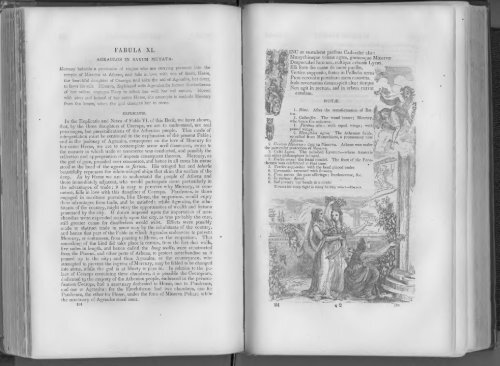THE METAMORPHOSES OF PUBLIUS OVIDIUS NASO
THE METAMORPHOSES OF PUBLIUS OVIDIUS NASO
THE METAMORPHOSES OF PUBLIUS OVIDIUS NASO
You also want an ePaper? Increase the reach of your titles
YUMPU automatically turns print PDFs into web optimized ePapers that Google loves.
FABULA XI.<br />
AGRAULOSIN SAXUM MUTATA.<br />
itfercury beholds a procession of virgins who are carrying presents into tho<br />
temple of Minerva at Athens, and falls in love with one of them, Herse,<br />
the beautiful daughter of Cecrops. and asks the aid of Agraulos, her sister,<br />
to favor his suit. Minerva, displeased with Agreulos for former disobedience<br />
of her orders, engages Envy to infect her with her evil nature. Moved<br />
with envy and hatred of her sinter Herse, she attempts to exclude Mercury<br />
from the house, when the god changes her to stone.<br />
EXPLICATIO.<br />
IN the Explicatio and Notes of Fable VI. of this Book, we have shown,<br />
that, by the three daughters of Cecrops, we are to understand, not real<br />
personages, but personifications of the Athenian people. This mode'of<br />
interpretation must be continued in the explanation of the present Fable ;<br />
and in the jealousy of Agraulos, consequent on the love of Mercury for<br />
her sister Hcrse, we are to contemplate some oivil dissension, owing to<br />
the manner in which trade or commerce was conducted, and possibly the<br />
collection and appropriation of imposts consequent thereon. Mercury, as<br />
the god of gain, presided over commerce, and hence in all cases his statue<br />
stood at the head of the agora or forum. His winged hat and talaria<br />
beautifully represent the white-winged ships that skim the surface of the<br />
deep. As by Herse we are to understand the people of Athens and<br />
those immediately adjacent, who would participate more particularly in<br />
the advantages of trade; it is easy to perceive why Mercury, or com<br />
merce, falls in love with this daughter of Cecrops. Pandrosos, or those<br />
engaged in maritime pursuits, like Herse, the emporium, would enjoy<br />
their advantages from trade, and be satisfied; while Agraulos, the inha<br />
bitants of the country, might envy the opportunities of wealth and fortune<br />
possessed by the city. If duties imposed upon the importation of mer<br />
chandise were expended mainly upon the city, as was probably the case,<br />
still greater cause for disaffection would exist. Efforts were possibly<br />
made to obstruct trade in some way by the inhabitants of the country,<br />
and hence that part of the Fable in which Agraulos endeavors to prevent<br />
Mercury, or commerce, from passing to Horse, or the emporium. That<br />
something of the kind did take place is certain, from the fact that walls,<br />
five miles in length, and hence called the long ivalls, were constructed<br />
from the Piraus, and other ports of Athens, to protect merchandise as it<br />
passed up to the city; and thus Agraulos, or the countrymen, who<br />
attempted to prevent the ingress of Mercury, may be fabled to be changed<br />
into stone, while the god is at liberty to pass in. In relation to the pa<br />
lace of Cecrops containing three chambers, it is possible the Cecropium,<br />
dedicated 19 the majesty of the Athenian people, embraced in the personi<br />
fication Cecrops, had a sanctuary dedicated to Herse, one to Pandrosos,<br />
find one to Agraulos; for the Erechtheum had two chambers, one for<br />
Pandrosos, the other for Herse, under the form of Minerva Polias; while'<br />
the sanctuary of Agraulos stood near.<br />
184<br />
'I<br />
INC se sustulerat paribus Caducifer ahs:<br />
Munychiosque volans agros, gratamque Minerva;<br />
Despectabat humum, cultique arbusta Lycasi.<br />
Ilia forte die castas de more puellas,<br />
Vertice supposito, fcstas in Palladis arces<br />
Pura coronatis portabant sacra canistris.<br />
Inde revertentes deus aspicit ales: itcrque<br />
Non agit in rectum, sed in orbem curvat<br />
eundem.<br />
NOTJE.<br />
1. Hinc. After the transformation of Bat-<br />
tus.<br />
1. Caducifer. The wand-bearer; Mercury,<br />
who bears the caduceus.<br />
1. Paribus alis: with equal wings; with<br />
poised wings.<br />
2. Munychios agros. The Athenian fields,<br />
BO called from Munycliium, a promontory near<br />
Alhens. .<br />
2. Gratam Minerva : dear tQ Minerva. Athens was under<br />
the particular protection of Minerva.<br />
3. Calti Lt/crei. The polished Lycteum—where Aristotle<br />
and other philosophers lectured.<br />
5. Festas arces: the festal citadel. The feast of the Pana-<br />
tlienoen was celebrated at that time. .<br />
5. Venice supposito: with the head placed under.<br />
6. Coronatis: crowned with flowers.<br />
6. Pura sacra: the pure offerings; frankincense, &c.<br />
8. In rectum: direct. ,<br />
8. Sed cv.rvat: but bends in a circle.<br />
Throws his sleep flight in many an airy whirl.—MILTON.<br />
185













